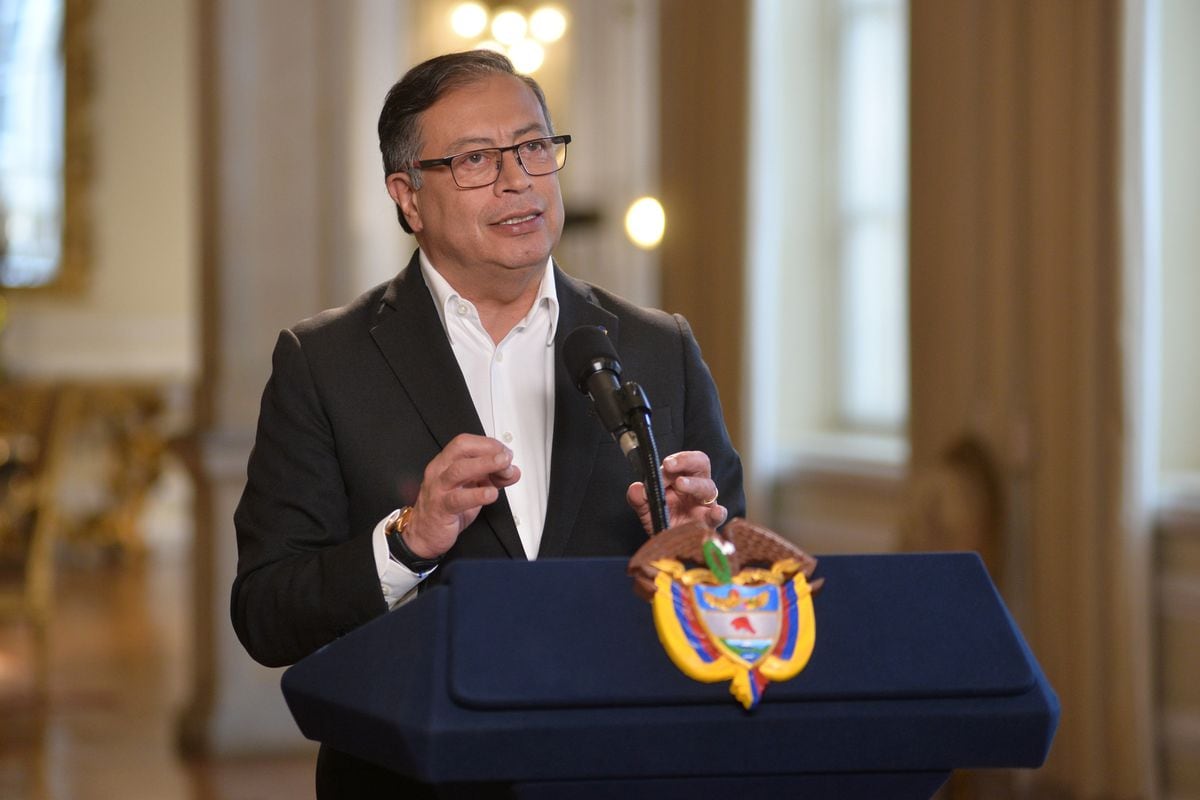- Photo courtesy of the Presidency of Colombia showing Colombian President Gustavo Petro in a televised address on Friday, from the Casa de Nariño in Bogotá (Colombia). Presidency of Colombia (EFE)
The news pulled the guerrillas out of the suffocation produced by Havana's humidity. One of them had just read with astonishment the statements of Gustavo Petro collected yesterday in the newspaper El Espectador and warned the rest. The president, the information read, doubted that the leaders sitting at the negotiating table with the government really ruled over the armed guerrillas and assured that their true raison d'être in these times was the illegal economy, that is, drug trafficking and extortion. The guerrilla delegates could not believe that the head of state, so rhetorical at times, suddenly stabbed them with this dagger without much thought. To make sure, they began to follow through a mobile phone the direct Twitter account of the Presidency, which broadcast an event in which the Petro addressed with passion and without any containment to the admirals and generals of the military forces. Methodical as they are, Pablo Beltrán and his family waited to see the transcription in Word to evaluate their words, lest there be some misunderstanding. There wasn't actually. Petro had said exactly what El Espectador was saying. Then, the ELN leaders took it as a real affront.
The issue has put in crisis the peace talks between the Government of Colombia and the ELN, which are taking place these days in Cuba. Twenty-four hours earlier, the guerrillas had issued a communique in which they came to say that everything was going great, that the table was advancing "rigorously" to reach the ceasefire that so obsesses the president and the mechanism to achieve the participation of society in the process. It was a mirage. Petro's energetic words before the uniformed, typical of those who like to repeat that he is the commander in chief of the armed forces, blew up all that harmony. "They sit at the table and talk, but are they in charge?" asked Petro. "There each of us has many questions. Are they really in charge?"
He was referring to historical guerrilla leaders such as Gabino, who has belonged to the ELN since childhood. Now he is old, the president said, and has sat down to negotiate. But does it really rule? Petro implied that it did not. The fronts are autonomous, they are federal, Petro continued, a claim maintained by some security experts. This thesis maintains that the guerrillas hiding in the camps in the middle of the jungle do not necessarily respond to the leadership, which is sitting at the negotiating table. "They all revolve around the illicit economy, they have little to do with Father Camilo Torres (one of the founders, a follower of Liberation Theology). They have the same flag, yes, but their raison d'être is the illicit economy," Petro continued.
ELN leader Nicolás Rodríguez Bautista, alias "Gabino" (r) and ELN chief negotiator Israel Ramírez, alias 'Pablo Beltrán' (l), during the start of the third cycle of peace talks between the Colombian government and the National Liberation Army (Ejército de Liberación Nacional – ELN), on May 2 in Havana, Cuba. Ernesto Mastrascusa (EFE)
This whole affair has inflamed the ELN negotiators, who feel insulted. The delegation has asked Petro to clarify as soon as possible if he considers that this negotiation is carried out with a political organization or with a criminal gang, as he has insinuated. What the president said, according to the guerrilla communique, is disrespectful and stigmatizing and undermines the agreement in Mexico, where both parties agreed on the need to overcome the armed conflict and move "towards national reconciliation." The guerrillas consider that this is also a question for the government delegation, the guarantor countries, the accompanying organizations (UN and Episcopal Conference of Colombia) and the accompanying countries, among which is Spain.
The reality is that Petro has sown discord in this negotiation. Sitting at the table, the parties have not had any problems, they have always shown a lot of harmony and encouragement to reach an agreement. However, everything is moving too slowly, in the eyes of the president. Petro is in a hurry to reach a ceasefire, for example. He tried to rush it into the new year by inventing that an agreement had been reached to implement it. The ELN felt drawn into something that had not been consulted and denied that such a truce existed. The guerrillas publicly denied the president. Months later, Petro said something more or less similar to what he has said this time, that the guerrillas had gone from a socially committed struggle to the business of drug trafficking and criminality. Skilled negotiators such as Senator Iván Cepeda and the High Commissioner for Peace, Camilo Rueda, have managed to overcome these obstacles that he has sown along the way, but on this occasion, in which a rectification is requested in public, the problem will not be easy to manage.
In a plenary session in Havana, ELN negotiators have asked for clarification, and the sooner the better. It seems highly unlikely that this would jeopardize the dialogue, but it could happen that this crisis sends the two delegations to consultations. The government would go to Bogota, and the guerrillas to the camps to assess the situation. It remains to be decided. What is certain is that Petro has once again strained the negotiations with the guerrillas with his words. He wants an agreement and he wants it now, and he will not be silent until it is reached. That will test the ELN's resilience.
Subscribe here to the newsletter of EL PAÍS about Colombia and receive all the informative keys of the current situation of the country.

